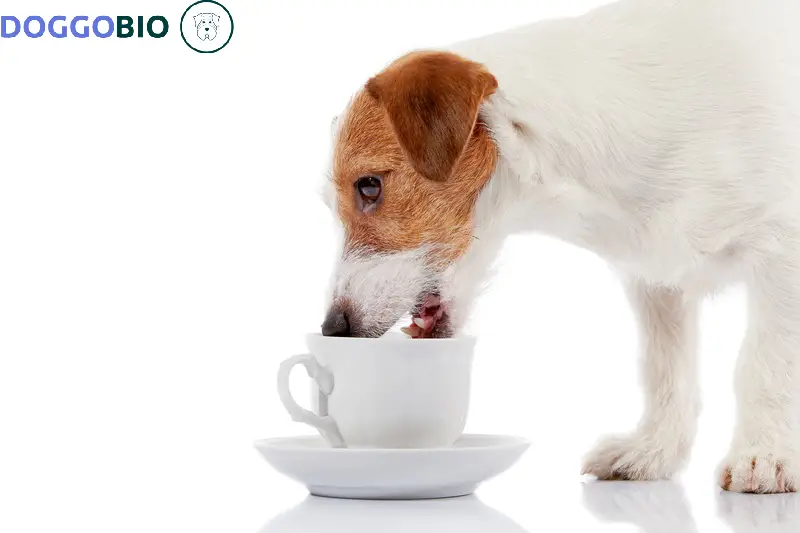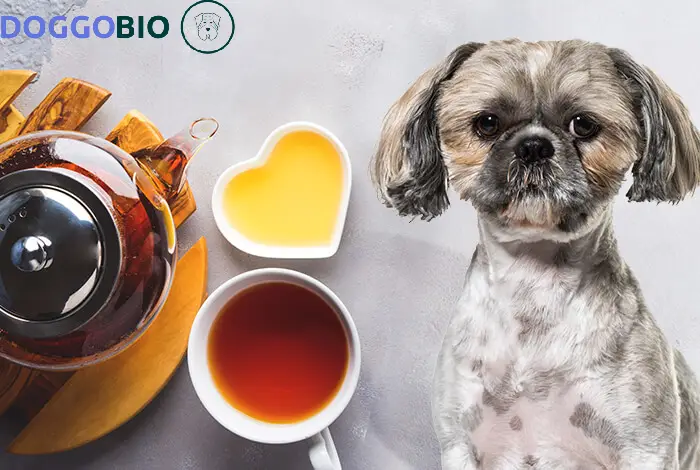As a responsible dog owner, you likely have common questions about what foods and drinks are safe and enjoyable for your furry companion. One query that may come to mind is “Can Dogs Drink Peppermint Tea?”.
The answer is no. While peppermint tea might be a refreshing beverage for humans, it’s not suitable for our canine companions.
In this article, we’ll delve into whether dogs can safely consume peppermint tea, weighing its potential benefits and risks. By the end, you’ll have a clearer understanding of whether peppermint tea can serve as a healthy and enjoyable treat for your beloved dog.
Can Dogs Drink Tea?

The answer is no. It is not recommended for dogs to drink tea. While it may seem harmless, tea contains caffeine and theobromine, which can be dangerous to dogs.
Consuming even small amounts of these substances can cause health problems such as vomiting, diarrhoea, restlessness, and in severe cases, death.
It’s good to remember that dogs have different nutritional needs than us and cannot consume everything we do. Therefore, it’s best to provide them with plain water or specially formulated dog-safe beverages.
These are designed to meet the specific needs of dogs and ensure their overall health and well-being.
Some teas also contain unsafe herbs and spices for dogs to consume. For example, chamomile and peppermint tea, commonly used to soothe stomach upset in humans, can cause vomiting and diarrhoea in dogs.
It’s always best to consult your dog’s veterinarian before giving your friend any human food or drink. They can provide specific recommendations based on your dog’s needs and health status.
It’s also important to be aware of other sources of caffeine, such as coffee, chocolate, energy drinks and some medications, which should also be kept out of your dog’s reach. If you suspect your dog has consumed caffeine and is showing signs of toxicity, it’s important to seek immediate veterinary attention.
In conclusion, it’s best to avoid giving tea to your dog. Stick to providing them with plain water or specially formulated dog-safe beverages to ensure their overall health and well-being.
Consult your veterinarian for expert advice if you have any concerns or questions about your dog’s diet and nutrition.
Can Dogs Drink Herbal Tea?

The short answer is no. Dogs should not be given herbal tea. While herbal tea may be a healthier alternative for humans, it is not the same for dogs. Herbal teas can contain substances that can be toxic to dogs and may cause stomach upset or other health problems.
Additionally, some herbs may have medicinal effects that can interact with any medications the dog may be taking or may have counter effects on the dog’s health.
It is important to remember that not all herbal teas are safe for dogs. Some herbs commonly used in herbal teas, such as chamomile, mint, and chamomile, can be harmful to dogs. Even if a specific herbal tea is safe for dogs, it is unlikely to provide any nutritional or health benefits.
It’s always best to be cautious and avoid giving herbal teas to dogs. Instead, please provide them with fresh water or specially formulated dog-safe beverages to ensure their well-being. If you have concerns about your dog’s health or suspect that your dog has consumed herbal tea, it’s important to seek immediate veterinary attention.
It’s also important to always be aware of potential sources of herbal teas and keep them out of your dog’s reach. Remember that some human food and beverages are not safe for dogs. Therefore, it’s always best to consult your veterinarian before giving your furry friend any new food or drink.
Dogs generally have different nutritional needs than humans, so it’s best to stick to dog-specific food and drinks. A well-balanced diet and hydration plan is the key to keeping your furry friend healthy and happy.
Consult your dog veterinarian if you have any questions or concerns about your dog’s diet and hydration.
Can Dogs Drink Peppermint Tea?
No, dogs should not drink peppermint tea.
Peppermint tea contains menthol, which can be toxic to dogs and may cause stomach upset or other health problems. Additionally, it may have harmful interactions with any medications the dog may be taking or may have counter effects on the dog’s health. It is best to give dogs water or specially formulated dog drinks.

Is Peppermint Tea safe for dogs?
No, peppermint tea is not safe for dogs. Peppermint tea contains menthol, which can be toxic to dogs and may cause stomach upset or other health problems. Additionally, it may negatively interact with any medications the dog may be taking or may have counter effects on the dog’s health. It is best to give dogs water or specially formulated dog drinks.
Can dogs drink warm tea?
No, dogs should not drink warm tea. Even if the tea is not hot enough to burn the dog, the caffeine and theobromine present in tea can still be toxic to them if consumed in any quantity. Additionally, warm tea may contain other ingredients that may not be safe for dogs to consume, such as herbs or spices.
Is it good to let my dog drink tea?
No, it’s not a good idea to let your furry friend drink tea. The caffeine and theobromine found in tea can be harmful to your dog if they consume too much, and it can cause some severe health issues. It’s best to stick to plain water or specially-made dog drinks to keep them safe and healthy.
Is tea harmful to dogs?
Yes, tea can be harmful to dogs if consumed in large amounts. The caffeine and theobromine in tea can cause stomach upset, restlessness, rapid breathing, muscle tremors, and even seizures in dogs.
In severe cases, it can cause death. It’s important to remember that dogs have a different metabolism than humans and some human food and beverages can be dangerous.
Effects of caffeine on dogs
Caffeine can have detrimental effects on dogs if consumed in large amounts. The symptoms of caffeine toxicity in dogs can include restlessness, rapid breathing, muscle tremors, increased heart rate, vomiting, and even seizures. In severe cases, caffeine toxicity can lead to death.
It’s important to note that even small amounts of caffeine can be dangerous for certain dogs, especially those that are small, older, or have pre-existing health conditions. Additionally, certain breeds of dogs may be more sensitive to caffeine than others.
It’s also important to remember that caffeine can be found in many different sources, not just tea, such as coffee, chocolate, energy drinks and some medications. Therefore, it’s important always to be aware of the potential sources of caffeine and keep them out of your dog’s reach.
If your dog is showing signs of toxicity or you suspect that they have consumed caffeine, it’s important to seek immediate veterinary attention.
The veterinarian may induce vomiting, give activated charcoal to bind any remaining caffeine in the stomach, provide fluids to flush out the kidneys and monitor the dog’s vital signs.
Is it worth the risk if caffeine is poisonous for dogs?

No, giving caffeine to dogs is not worth the risk, as it can be highly poisonous. The potential negative effects of caffeine on a dog’s health far outweigh any potential benefits. Even small amounts of caffeine can cause serious harm to dogs, and consuming large amounts can be fatal.
It’s always best to be cautious and avoid giving dogs caffeine. Instead, please provide them with fresh water or specially formulated dog-safe beverages to ensure their well-being.
If you are concerned about your furry friend’s health or suspect it has consumed caffeine, it’s important to seek immediate veterinary attention.
It’s also important to always be aware of potential sources of caffeine and keep them out of your dog’s reach. Remember that caffeine is present in many things like tea, coffee, chocolate, energy drinks, and some medications.
So, it’s important always to be vigilant and keep these things away from your dog.
What are the signs of caffeine toxicity in dogs?
The signs of caffeine toxicity in dogs can include the following:
- Restlessness and agitation
- Rapid breathing
- Increased heart rate
- Muscle tremors
- Vomiting
- Diarrhoea
- Seizures
In severe cases, death
It’s important to note that the symptoms of caffeine toxicity can vary depending on the amount consumed, the size and breed of the dog, and pre-existing health conditions. It’s also important to remember that caffeine can take several hours to metabolise in dogs fully, so symptoms may not appear immediately after consumption.
What are the safer alternatives to tea for dogs?
The safest alternative to tea for dogs is plain water. Water is essential for a dog’s overall health and hydration. It should always be available and make up most of their daily fluid intake.
Another safe alternative for dogs is specially formulated dog-safe beverages. These can include electrolyte solutions, which can help dogs stay hydrated during hot weather or intense exercise, or nutrient-rich liquids that can help dogs who have difficulty eating or digesting solid food.
These specially formulated dog-safe beverages can be found in pet stores or prescribed by a veterinarian.
It’s important to remember that not all human food and beverages are safe for dogs. Therefore, it’s always best to consult your veterinarian before giving your furry friend any new food or drink.
Some Posts You Wanna Read More
- What Can Dogs Drink Besides Water?
- Can Dogs Drink Apple Juice?
- Can Dogs Drink Ensure?
- Can Dogs Drink Soda?
- Can Dogs Drink Yakult?
- Can Dogs Drink Sparkling Water?
- How Long Can A Dog Go Without Water?
- How long Can A Puppy Go Without Eating Or Drinking?
Conclusion
In conclusion, while peppermint tea is generally safe for dogs to consume in moderation, it’s important to be mindful of potential risks associated with its consumption. Peppermint tea can offer several benefits for dogs, including freshening their breath, aiding in digestion, and soothing upset stomachs.
However, it’s essential to keep in mind that some dogs may have allergies or sensitivities to peppermint, and too much tea can cause upset stomachs and diarrhea. It’s always best to consult with your veterinarian before introducing new foods or beverages into your dog’s diet to ensure they are safe and appropriate for your furry friend. As with any new treat, start with small amounts and monitor your dog’s reactions carefully to ensure their health and safety.

Pingback: What Can Dogs Drink Besides Water? Essential Alternative 2024
Pingback: Can Dogs Drink Yakult? Surprising Benefits & Safety Tips! 2024
Pingback: How Long Can A Dog Go Without Water? 2024